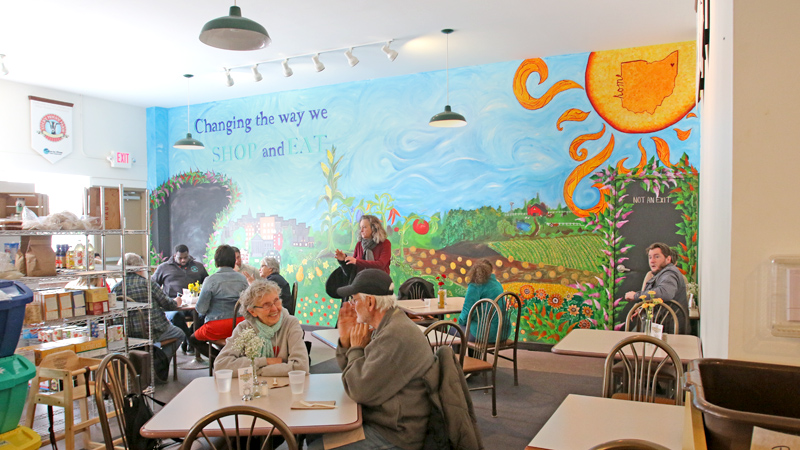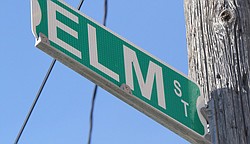Youngstown's North Side perking up, surprising some

By JESSICA HARDIN
jhardin@vindy.com
YOUNGSTOWN
The prime spot for people watching on the newly bustling Elm Street is a table inside Culturehouse Coffee.
Even on a blustery day, people passed by the shop amid the swirl of snowflakes.
A pair of Youngstown State University students studied at one of the tables in the well-lit shop marked by bright wooden floors, clean white walls and sea-foam green accents.
Culturehouse Coffee is one of four businesses that opened on the block in 2018, along with Her Primitive Ways Red Road Apothecary and two art studios.
A man walked into the coffee shop with his son last week and expressed surprise that businesses sprouted amid the block’s familiar blight.
“I graduated from YSU in 2006, and it hardly looks like the same place,” he said.
The North Side, known for its once stately mansions and wooded parks was home to Youngstown’s wealthiest families during the height of the steel industry.
Many years later, after the steel industry collapsed, Elm Street acquired a reputation as a dangerous part of town.
“It was quite literally the ‘Nightmare on Elm,’” said Jonathan Blackshire, president of the Wick Park Neighborhood Association.
Despite the surrounding blight, two anchor businesses have continued to thrive: Edward’s Flowers, which opened in 1947, and Full Circle Florist, which opened in 2005.
Blackshire described the area’s redevelopment as “a continual effort with a lot of setbacks.”
Common Wealth Inc., a non profit community development organization, has been at the helm of the work.
The organization formed in the mid-1980s. For the last 30 years, Common Wealth has worked to spur housing and business development throughout Youngstown.
In 2013, the organization opened Common Wealth Kitchen Incubator, a shared-use commercial kitchen on the block between Baldwin Street and Park Avenue that aims to lower the cost of starting or expanding local food businesses.
Common Wealth’s second, related venture was the opening of Cultivate: a co-op cafe in 2016, right next door.
Since the start of the new year, Elm Street Diner has been open across the street from Cultivate. A vintage clothing shop is expected to open on the block this spring.
“I’m shocked there’s a lot of enthusiasm,” said Ron Heinbaugh, the owner of Elm Street Diner.
Stephen Protheroe, the owner of Culturehouse, echoed the sentiment.
“The overall welcome reception has been really, really good,” Protheroe said.
“I mean, in terms of my business plan, I’m in the fourth month already, of what I projected for the first month,” Heinbaugh said, meaning he’s ahead of where he planned to be.
The area itself is well suited to development. It’s minutes from downtown, close to major highways and on the edge of YSU’s campus.
The North Side is one of the few neighborhoods in Youngstown you could live in without needing a car, added Heinbaugh.
“Between Wick Park and the hospital and the JCC [Jewish Community Center] and Stambaugh [Auditorium], it’s the ideal neighborhood,” said Pat Rosenthal, executive director of Common Wealth.
In response to the block’s business boom, Common Wealth Inc. created “Growing Elm Street” in the spring of 2018. The group focuses on increasing development in the area through marketing and relationship-building.
“I went to each business and had conversations with everybody and I continue to do that now. I think that personal connections and one-on-one relationship-building really helped get some traction for what we’re doing here,” said Abby Webb of AmeriCorps VISTA, who works for Growing Elm Street.
North of Madison
In its infancy, the organization tried on the name “NoMa” — short for North of Madison. The abandoned name can be found adorned on a bike rack outside Full Circle Florist, on a billboard on the side of Culturehouse Coffee and on a mural inside Cultivate Cafe.
The organization refocused on the slice of Elm between Madison and Broadway. They now call the area the Elm Street corridor.
Seeking branding for the community perfectly encapsulates the challenges the group faces, namely, getting the word out that the neighborhood exists and getting buy-in from the existing community.
“I still have thousands of students at YSU that don’t know this cafe is here,” said Susan Payton, manager at Cultivate Cafe and a YSU professor.
She has been running the cafe for about two years and watched Growing Elm Street work to harness the area’s fledgling development.
“Finding the right fit has been really difficult. ... Our cafe was founded on the theory that we would provide a place for the local folks to shop, and we still don’t have a total buy-in with the community,” Payton said.
Part of the challenge lies in the fact that the market for local businesses is unexpectedly diverse.
“I get the hippies, the hippie do-gooders, I get business people. Some locals, college kids, college professors. All ages,” Payton said.
The challenge of connecting with the market on Elm Street is perhaps most evident in the community’s reception to the goods being sold.
“I’ve had people from the neighborhood come in and go, ‘Oh my gosh, it’s $6 for a grilled cheese?’ Yes, but we use locally produced bread from an artisan shop, plus we use good quality cheese. It’s not processed cheese,” Payton said. “We know there’s a lot of poverty in this area. Do we want to go against our own mission by serving products that aren’t nutritious?” Payton asked.
In a community hit hard by poverty, it can be difficult to ask neighbors to put a premium on local, organic products. Protheroe found a solution in a diverse menu.
“I try to have a balance with our menu. You can come in and get a drip coffee for $2. I think that’s something everyone can afford. No matter who you are off the street, you can come in and you got two bucks and you can get a hot coffee and stay warm,” Protheroe said.
Payton offsets the cost of her local product by participating in programs such as Produce Perks SNAP Double Up program run through Youngstown Neighborhood Development Corporation and Mercy Health Foundation Mahoning Valley.
If you come in with your food card, for every dollar that you spend up to $30, you get free tokens for fresh produce, Payton explained.
“I have a guy who comes in weekly, he uses his EBT [card], gets his tokens. He’ll buy his grocery portion with his EBT, and then all of his produce is free,” Payton said.
Gentrification
Many other cities have struggled with redevelopment that prices out existing residents.
The Rev. Joseph Boyd, pastor of First Unitarian Universalist Church of Youngstown on Elm, said the familiar pattern won’t be a problem for Youngstown.
“The plus of that is that Youngstown will have to invent its own rules. It can’t follow the gentrification that’s happening in other cities, and that’s a good thing,” said the Rev. Mr. Boyd.
One hallmark of gentrification is renovation of housing stock and selling it at a significantly increased price.
But flipping homes to make a quick buck is not possible here, said Heinbaugh. People that purchase these homes and put $100,000 worth of work into them are staying.
“There’s young people buying homes, which I think is very exciting. And they realize that [the houses] are underwater when they buy them, but they’re willing to make that sacrifice to get the neighborhood on the right track,” said Heinbaugh.
This motivation is reflected in the business owners on Elm Street.
“I feel like we realized we can change our area and be the change we want to see. I think, for us, it was about having more places to go,” Protheroe said.
Heinbaugh moved from the trendy Cleveland neighborhood of Ohio City to return to the North Side, where he lived in the 1980s.
When asked, “Why here?,” he answered simply: “To be part of the revitalization of Youngstown.”
But the folks on Elm Street aren’t naive about what revitalization would mean for the city. They aren’t necessarily expecting a spark lit on Elm Street to spread and turn Youngstown into Cleveland.
“I’m less interested in the question of how can we totally have a boom in Youngstown. I’m more interested in the question of, for people who live here, how can we make this creative and fun and a place where we can call home,” said Mr. Boyd.
Injecting life
And despite failed attempts, people are trying to inject life into the city in unique ways.
“I think that what I see happening in Youngstown with these new businesses is experimentation. The beauty I think of Youngstown in this moment is there’s no wrong answer. I think that the only wrong answer is not to do anything,” Mr. Boyd said.
The next step to making Elm Street’s redevelopment take root is persuading more people to trek to the North Side for a cup of coffee or a homemade sandwich.
“I think overcoming the negative, unsafe image has taken time,” Rosenthal said.
 43
43

